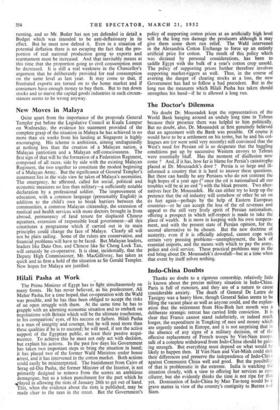The Doctor's Dilemma No doubt Dr. Moussadek kept the representatives
of the World Bank hanging around an unduly long time in Tehran because their presence there was helpful to him politically. But no doubt, also, Dr. Moussadek at first genuinely believed that an agreement with the Bank was possible. Of course it would have to be a settlement on his terms, but he and his col- leagues are (or were until very recently) still convinced that the West's need for Persian oil is so desperate that the haggling conditions put up by successive Western envoys to Tehran were essentially bluff. Has the moment of disillusion now come ? And, if it has, how far is blame for Persia's catastrophe placed at Dr. Moussadek's door ? Persia is so large and ill- informed a country that it is hard to answer these questions. But there can hardly be any Persians who do not contrast the high hopes of a year ago (" once the oil is nationalised all our troubles will be at an end ") with the bleak present. Two alter- natives face Dr. Moussadek. He can either try to keep up the pretence that the oil industry will somehow or other be set on its feet again—perhaps by the help of Eastern European countries—or he can accept the loss of the oil revenues and appeal to the still very lively spirit of Persian nationalism, offering a prospect in which self-respect is made to take the place of wealth. It is more in keeping with his own tempera- ment, and with the present state of Persian opinion, for the second alternative to be chosen. But the new doctrine of austerity, even if it is officially adopted, cannot cope with certain very pressing problems—unemployment, the lack of essential imports, and the means with which to pay the army, police and civil service. These practical problems may in the end bring about Dr. Moussadek's downfall—but at a time when that event by itself solves nothing.


































 Previous page
Previous page